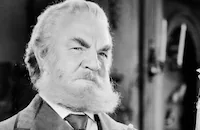Under Your Spell
Cast & Crew
Otto Ludwig Preminger
Lawrence Tibbett
Wendy Barrie
Gregory Ratoff
Arthur Treacher
Gregory Gaye
Film Details
Technical Specs

Synopsis
In New York City, opera singer Anthony Allen is tired of being forced by his overbearing manager Petroff to engage in silly publicity stunts. When they go to Chicago, socialite Cynthia Drexel meets with Petroff and makes a deal to have Tony sing at her party for $15,000. She then returns to her seat at Tony's performance to join her Uncle Bob and Count Raul Du Rienne, whom Uncle Bob wants her to marry. Cynthia has placed a bet with Raul to keep him from seeking a marital commitment from her. When Petroff pulls another publicity stunt on Tony, the opera singer escapes from him and flies to New Mexico, where, in his hometown, his friends throw a party in his honor. The next day, when Petroff calls Tony, Tony immediately leaves for his cabin in the Sierra Madres, hoping to elude Petroff. Incensed at Tony's disappearance, Cynthia flies her private plane to New Mexico in order to bring him back to fulfill her contract. While in the air over the Sierras, Cynthia sees Tony bathing in a mountain waterfall, so she lands in a nearby field. She informs him of her intention to bring him back, but he remains steadfast in his refusal to leave. Her Uncle Bob, led by Tony's valet Botts, then arrives and tells Cynthia of the scandal her visit has caused. Angry at Tony, whom she believes ran away in order to cause just such a scandal, Cynthia leaves in a rush, neglecting to pick up her suitcase. Now interested in her, Tony returns to the city under the guise of returning her belongings. When Tony arrives at her house, Cynthia berates his singing and informs him of her betrothal to Raul, which infuriates Tony, who then leaves. As he boards a boat, Tony is arrested for breach of contract, but when he faces the judge, he explains that he will not sing for Cynthia because she does not appreciate talent. The judge agrees with Tony and dismisses the case. Leaving the courtroom, Tony is followed by Uncle Bob, who explains that if Cynthia were to marry Raul, it would be a mistake and that she is only lacking a good spanking. Tony then hides in a doorway, and when Cynthia walks by, he pulls her aside and proceeds to spank her. They emerge disheveled after which Petroff calls together a press conference, and the happy couple signs their marriage license.

Director

Otto Ludwig Preminger
Cast

Lawrence Tibbett

Wendy Barrie

Gregory Ratoff

Arthur Treacher

Gregory Gaye

Berton Churchill
Jed Prouty
Charles Richman
Claudia Coleman
Robert Royce
Valerie Whiting
Anita Camargo
Rosemary Grimes
Ethel Carpenter
Margaret Davis
Betty Dotson
Fay Estill
Lucille Harding
Billie Huber
Maria Iturbi
Diane Marshall
Lucille Porcett
Eve Reynolds
Eloise Rawitzer
Mildred Sellers
Mary Louise Smith
Dorothy Stevens
Marion Strickland
Marjorie Timm
Leon Vallee
Louis Williams
Stacy Williams
Louis Aldez
Joan Drake
Carmen Bailey
Lorraine Bond
Yvonne Bowman
Jeanne Dunne
Elena Duran
Mariano Betancourt
Paul Blanton
James Coleman
Pat Cummings
Sayre Dearing
Jack Fife
Milton Gowman
Bob Hodges
Jack Latham
Frank Leyva
Paul Lopez
Ernesto Piedra
William Riviere
A. Rodriguez
Tony Roux
Jack Sharum
Crew
Fred Allen
Jules Barbier
Sy Bartlett
Michel Carré
Duncan Cramer
Howard Dietz
Saul Elkins
Charles Gounod
Herschel
Frances Hyland
Arthur Lange
Sammy Lee
Harry M. Leonard
Bernice Mason
Jack Mcedwards
Paul Neal
Gioacchino Antonio Rossini
Arthur Schwartz
Cesare Sterbini
John Stone
Sidney Wagner

Film Details
Technical Specs

Quotes
Trivia
Notes
The plot summary was based on a screen continuity in the Twentieth Century-Fox Produced Scripts Collection, and the onscreen credits were taken from a credit sheet in the Twentieth Century-Fox Records of the Legal Department, both of which are at the UCLA Arts-Special Collections Library. The working title of this film was Love Flight. The film was a remake of Fox's 1934 Spanish-language production, Las fronteras del amor, which was directed by Frank Strayer and starred José Mojica and Rosita Moreno. This was director Otto Preminger's first American film. Although a Hollywood Reporter news item dated June 3, 1936 states that this was Preminger's first film, he had previously directed a film in Vienna in 1931 entitled Die Grosse Liebe. The news item notes that Preminger, who was known as a Viennese and Broadway stage director, had been with Twentieth Century-Fox since the beginning of 1936 studying film technique. In his autobiography, Preminger states that after this training period, studio head Darryl Zanuck assigned him to direct Metropolitan opera star Lawrence Tibbett in this film, to be made at Sol Wurtzel's "B" unit, rather than in the "A" unit, because Zanuck was angry at Tibbett, who, according to Preminger, cost the studio about $100,000 per picture. Tibbett, Preminger related, had signed with the studio for a one-year, two-picture contract, but after the box-office failure of his first film, the "A" picture Metropolitan, Zanuck tried to settle with him to end the contract. Tibbett refused and Zanuck, therefore, gave the film to a newcomer, Preminger, so that he could practice on Tibbett, whom he thought would never be a success in films. According to the autobiography, Preminger was promoted to the studio's "A" unit after the success of this film. This was the last film made by Tibbett, who was considered one of the world's top baritones. The New York Times review commented that "his voice remains the richest, the most dramatic, the most beautifully controlled vocal instrument on the contemporary screen." The 1991 film Bugsy, directed by Barry Levinson, features Tibbett as a character. In that film, title character Bugsy Siegel buys Tibbett's house in Beverly Hills.












